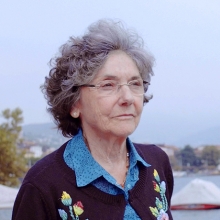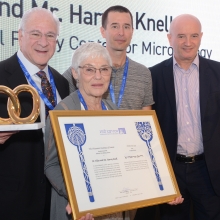IN MEMORIAM - Prof. Avi Minsky
Prof. Avi Minsky’s career was marked by significant contributions to our understanding of DNA organization and cellular survival mechanisms
Briefs

Longtime Weizmann faculty member and accomplished virologist Prof. Abraham (Avi) Minsky passed away in January 2024 at the age of 72.
Born in Haifa in 1952, he earned his MSc and PhD in chemistry from the Hebrew University of Jerusalem, where his doctoral supervisor was the late Prof. Mordecai Rabinovitz. After completing his PhD in 1984, he spent three years at Harvard University for a postdoctoral fellowship. Prof. Minsky, an enthusiastic participant in scientific conferences and events, was an avid traveler, who always held Boston as one of his favorite cities.
Prof. Minsky returned to Israel in 1987 and joined the Weizmann Institute as a principal investigator. Starting in the early 1990s, when electron microscopy was in its infancy, he embraced this emerging technology, using high-resolution electron microscopy and electron tomography to explore cellular adaptations to harsh environmental conditions, starvation, and oxidative stress. His revolutionary discovery of a bacterium with uniquely organized ring-like DNA, which conferred exceptional resistance to radiation, has been particularly influential. This finding provided profound insights into cellular defense mechanisms and has implications for improving organismal resilience in extreme environments.
Prof. Minsky’s innovative work earned him membership in the esteemed European Molecular Biology Organization (EMBO) in 2005. He also played a pivotal role in establishing the Irving and Cherna Moskowitz Center for Nano and Bio-Imaging at the Weizmann Institute in late 2006. Under his leadership, the Moskowitz Center became a hub for advanced microscopy research, supporting projects from dozens of research groups at the Institute. The Center’s integration of ultrahigh-resolution light microscopy and electron microscopy has facilitated impactful studies in fields from nanotechnology to marine biology.
Later in his career, Prof. Minsky studied giant DNA viruses, revealing structural details about their infection cycles, and contributing significantly to the understanding of viral biology. His work on the mimivirus—a genus of giant viruses hosted by amoebae—was referenced in This Book Will Blow Your Mind, a popular book on major scientific breakthroughs published by New Scientist magazine in 2018.
From 2011-2017, he served as Head of the Department of Structural Biology (now the Department of Chemical and Structural Biology). In 2022, he was honored with the title Professor Emeritus.
Beyond his scientific achievements, Prof. Minsky was known for his deep appreciation of music, especially classical pieces and French chansons. Living on campus, he maintained a beautiful cactus garden, which he greatly enjoyed tending.
Dr. Smadar Zaidman from the Department of Chemical Research Support, who spent nearly 10 years in the Minsky lab as an MSc and PhD student and remained a close friend until his death, describes Prof. Minsky as an extraordinarily articulate, emotive, and gifted lecturer and a warm and caring mentor. She fondly remembers him supervising his students with great dedication, always involved, passionate, and painstaking about every aspect of research, down to the tiniest details about how a study was planned, performed, and reported.
Fond of children and animals, Prof. Minsky never had a family of his own. “All of us students were like his children,” Dr. Zaidman says.
Prof. Minsky’s legacy lives on through the scientists he mentored and the profound insights he contributed to the scientific community. His enduring passion for science remains a source of inspiration and pride for all who knew him.








